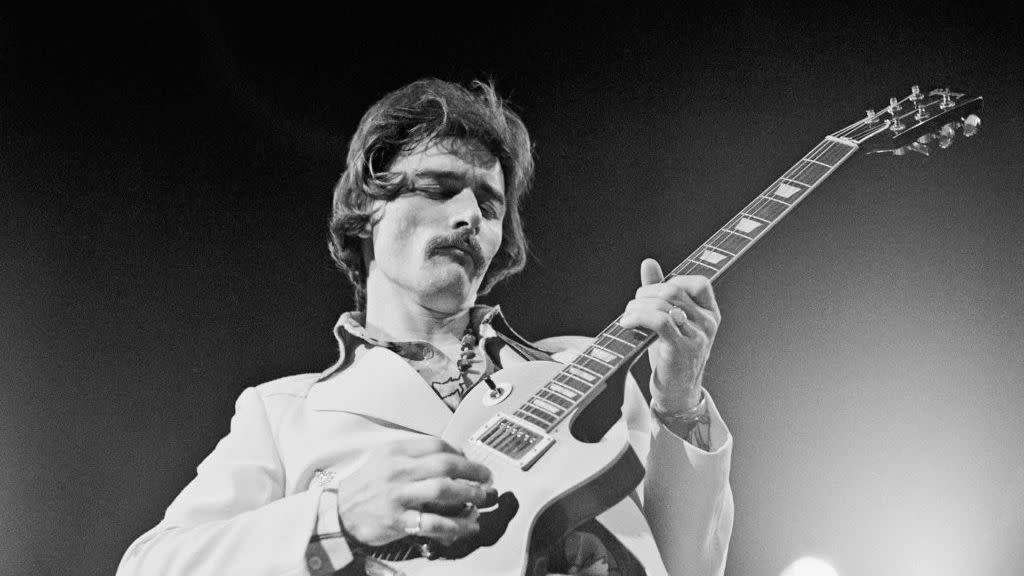Dickey Betts Only Needed 5 Minutes to Write ‘Ramblin’ Man,’ One of the Biggest Rock Songs Ever

"Hearst Magazines and Yahoo may earn commission or revenue on some items through these links."
The Allman Brothers Band frontman Dickey Betts claimed he penned the group’s single “Ramblin’ Man” in roughly the same amount of time it takes to actually listen to the song.
In doing so, he created one of the most recognizable rock tracks ever.
A standout vocalist and guitarist, Betts died Thursday at age 80, at his home in Osprey, Florida, of complications from cancer and chronic obstructive pulmonary disease. “Dickey was larger-than-life, and his loss will be felt worldwide,” his family said in a statement.
Betts was a member of The Allman Brothers Band for more than 30 years and is best known for writing and singing “Ramblin’ Man.” The 1973 smash became the group’s only top-10 hit, rising all the way to No. 2 on the Billboard Hot 100, and helped cement their legacy as future Rock & Roll Hall of Fame inductees.
But compared to how impactful it became, Betts had a surprisingly easy time creating the tune.
Listen to “Ramblin’ Man” on Apple Music and Spotify.
Betts led The Allman Brothers Band after two deaths
Betts created The Allman Brothers Band’s defining hit after a pair of tragedies thrusted him into the spotlight.
Born on December 12, 1943 in West Palm Beach, Florida, Betts showed musical skill from an early age, learning to play the ukelele around age 5 and the banjo and mandolin soon after. According to Rolling Stone, he formed his own band as a teenager as a side project to his jobs as a house painter and mail carrier.
After touring with a Midwestern band called the Jokers in the mid-1960s, Betts formed another group of his own, the Second Coming, with bassist Berry Oakley. In a lucky break, the two met up for a jam session with Duane Allman, who recruited them to join him and his brother, Gregg Allman, in The Allman Brothers Band in 1969. Betts quickly made his mark with the group, penning the hit "Revival” on their album Idlewild South the following year and becoming known for his on-stage guitar duels with Duane.
However, that chemistry was lost when Duane Allman and Oakley died in separate motorcycle accidents in 1971 and 1972, respectively. “Duane was bursting with energy; he was a force to be reckoned with. His drive and focus, as well as his intense belief in himself and our band, was incredible,” Betts told Guitar World in 2007. “He helped us all believe in ourselves, too, and that was an essential key to the success of The Allman Brothers Band.”
Whether he liked it or not, Betts became the new force of the group as its de-facto frontman and lead guitarist.
A conversation with a friend inspired “Ramblin’ Man”
The group would experience their first widespread success with the 1973 album Brothers and Sisters, which contained the songs “Jessica”—named after Betts’ daughter—and, of course, “Ramblin’ Man.”
Betts told AXS TV the inspiration for the song stemmed from a conversation he had while living with a friend named Kenny Harwick, who built barbed wire fences for ranchers. It was around this time he said he started to truly “make it” playing music.
“I would come back to see him every night. He’d say, ‘How you been doing? Playing your music and doing the best you can, I reckon,’” Betts said. “And that line just stuck with me. I said, ‘That's rhythm, [a] rhythmic line.’”
Betts kept the idea for a song in his mind for over a year before finally putting lyrics to paper in 1972. The title was inspired by country legend Hank Williams’ 1951 song of the same name.
“I changed it around, and instead of ‘playin’ my music,’ [I wrote] 'I’m tryin’ to make a livin’, you know? Trying to relate to people that don’t play music,” Betts explained. “I sit down to write it, and I wrote it in five minutes. It’s like you [were] writing a letter to your girl.”
The song wasn't going to be on the album
Betts initially wasn’t going to include the song on the group’s breakout album. He felt it had a country flavor and would need to first be “Allmanized” into a rock-blues track.
Betts told the Wall Street Journal he found inspiration from Eric Clapton’s hit "Layla,” which featured a long jam at the end of the song. He also knew the song needed a catchy introduction, so he created the fiddle-like opener on a pentatonic scale.
During the recording session, pianist Chuck Leavell exchanged lines with Betts and worked on the song’s harmonies. Then Betts had another clever idea: dubbing a guitar solo over four other guitars playing a mix of high and low notes to create the song’s now-iconic sound. “All of it together had a big, symphonic sound. It was like Benny Goodman’s stuff in the ’30s. His band was arranged so it would have this big, broad sound, with Benny’s high clarinet weaving in and out. The contrast was exciting,” Betts said.
It was also the last song Oakley worked on before his death a month later.
Bob Dylan loved "Ramblin' Man"

The song was an immediate hit and was played on the radio so much that “you couldn’t escape it,” according to the band’s photographer Kirk West.
If Betts and the band needed any more proof they had created an enduring classic, folk icon Bob Dylan admittedly loved “Ramblin’ Man.” Dylan even invited Betts onstage at a 1995 concert in Tampa and requested that they perform the song together. Betts offered to quickly write down the lyrics for his unexpected duet, but Dylan responded, “I know the words. I should have wrote that song.”
“He knew the song word for word. Man, it was such an honor," Betts told the Sarasota Herald-Tribune in 2018. “He sang it and I told him later that those words have never had so much feeling.”
The Allman Brothers Band never had another song reach the heights of “Ramblin’ Man,” and they split up and reunited twice by 1989. Betts eventually left the group for good in 2000.
The Allman Brothers Band was inducted into the Rock & Roll Hall of Fame in 1995, and “Ramblin’ Man” remains their most famous tune. “It was a big surprise to me that people liked it as much [as they did],” Betts said.
You Might Also Like
